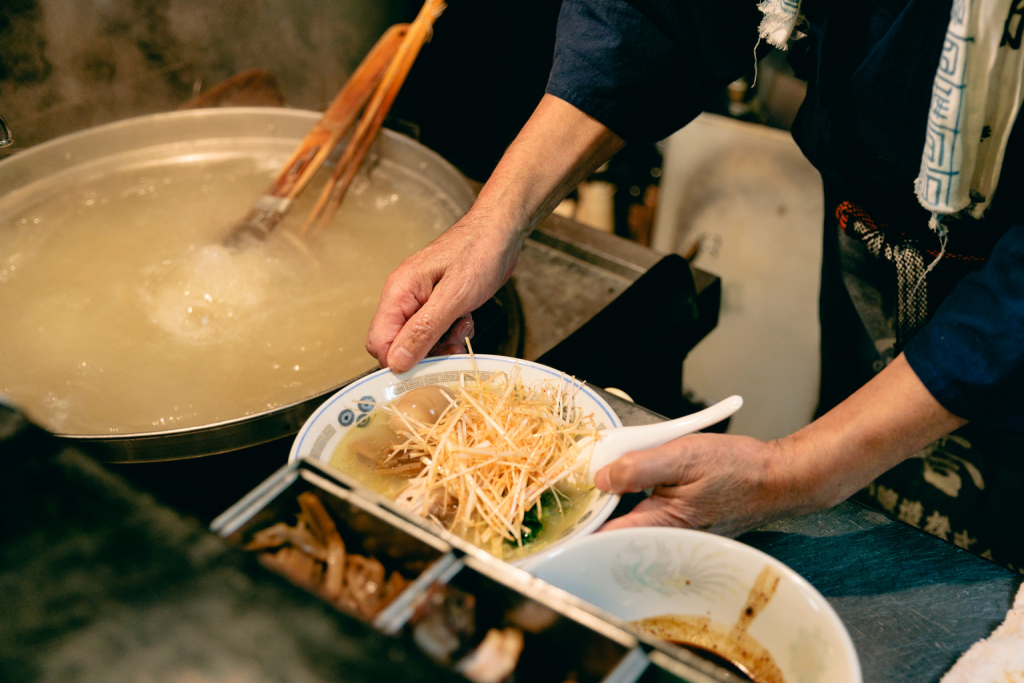Goro Inogashira is a traveling salesman who about halfway through each episode of Solitary Gourmet (Kodoku no Gurume) finishes his business dealings and enjoys a meal at a local restaurant. And that barebones of a premise has been enough to fill 108 episodes of live-action television and counting, plus six specials, an animated series and a Chinese remake. What’s Solitary Gourmet’s secret? Well, it’s not because the series is “food porn” or anything as reductive as that.
The Appeal of Solitary Gourmet
The food that Goro enjoys onscreen always looks delicious and stories about food have been popular in Japan before. However, Solitary Gourmet lacks the manic energy of Toriko or the dramatic stakes of Food Wars! It’s just a story about a regular man enjoying a nice meal on his own, with “on his own” being the important part.
Goro, played by Yutaka Matsushige — who interestingly also appeared in the very first episode of another wildly popular, food-based TV show: Midnight Diner — always eats alone. It’s one of the main attractions of the show.
In a way, Solitary Gourmet predicted the future. The show premiered in 2012, long before the pandemic or the “ohitorisama” (party of one) phenomenon of people embracing the solo lifestyle by going by themselves to karaoke, the movies or restaurants. The term became a bit of a buzzword in 2020 but it tapped into feelings that people all over the world have had for a very long time. Feelings that were first captured on screen by shows like Solitary Gourmet, which gave people content they didn’t even know they craved. Speaking of content…
Creating a Local Buzz
“Contents tourism” is when people travel to visit locales from movies or TV shows. Take Ube in Yamaguchi Prefecture for example, which used to be a quiet, regular city until its native Hideaki Anno became famous for creating Evangelion and actually used real-life locations from his hometown in the franchise’s last movie Evangelion: 3.0+1.0 Thrice Upon a Time. Since its premiere, fans of Evangelion have been flooding to Ube to take pictures at the train station or the chemical factory featured in the film. Solitary Gourmet offers similar thrills because every restaurant featured on the show is 100 percent real, except for the staff, who are replaced by trained actors for each episode.
This means that every meal that Goro enjoys on the show can also be enjoyed in real life, turning the series into a televised food guide for your next visit to Japan. And the best part is that none of it feels like an advertisement. There’s always the feeling that a restaurant can only appear on Solitary Gourmet if it offers genuinely good, non-pretentious and affordable food.
Solitary Gourmet is essentially a show about how the working class eats. So, expect less dolphin stuffed with pheasant and more different ways to cook a piece of pork or fish and serve it on rice with some vegetables. But if you saw a restaurant on the show that you want to visit, you’d better hurry.
There’s a Kind of Quiet Sadness to Solitary Gourmet
Every restaurant visited by Goro is a non-franchised eatery. Some have been there for close to a century while others might be a recent, weekend hobby operating out of the proprietor’s home. Japan’s kind of lax zoning laws make those kinds of places possible. But its aging population and encroaching corporatism threaten them on a daily basis. In many cases, there are no successors in place to take over the restaurant when the owner gets too old to work or simply decides their hobby has run its course. That’s another reason why people tune into Solitary Gourmet. It shows them snapshots of a world that is slowly dying. They, therefore, want to see as much of it as possible before it’s gone.

Ultimately, Though, the Series Is Uplifting and “Healing”
Goro often comments on how beautifully the food he eats is arranged and the series does spend some time showing the physical act of him chewing and swallowing. But not too much time. This isn’t one of those internet videos where food is shot from what can only be called “porn angles” and eaten in an almost indecent fashion. On Solitary Gourmet, food isn’t fetishized. It’s enjoyed. Not too fast and not too slow. It’s not “food porn.”
None of the food that Goro eats is ever the greatest thing he ever tried. It’s always good but it’s not life changing. The meals presented on the show are tiny oases of happiness in the life of a Japanese businessman. They’re little pleasures found in the everyday, not unlike the stuff you might find in the “iyashikei” genre of “healing” anime. Plus, it helps that the show occasionally gives you genius food hack ideas, like squishing barbequed tsukune (chicken meatballs) into raw green pepper halves before eating. Try it. It’s fantastic. As is Solitary Gourmet.









